Written by special contributor Lance Fleming
It only takes a few seconds of studying the mission of ACU’s College of Business Administration (COBA) to discern that the holistic development of its students is as important as anything else that goes on in the Mabee Business Building.
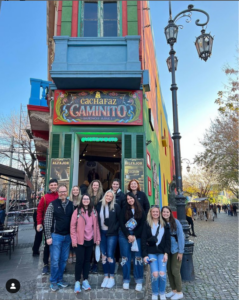
Dr. Andy Little and students during their Study Abroad trip to Montevideo last summer.
The first point of the mission statement is “holistic student learning and development.” That part of the mission goes on to say that ACU “seeks spiritual, academic, and professional growth over the life of each student through exemplary teaching, experiential learning, and relationships with Christian faculty, professional staff, and engaged alumni.”
It’s all part of equipping the next generation of global leaders with all the tools necessary to be successful in their homes, in their places of worship, in their communities, and in their places of work.
“While great teaching is essential to what we do, we want to emphasize how our students learn and develop both inside and outside the classroom,” said Dr. Brad Crisp, Dean of the College of Business Administration. “That is why we are partnering with the university in the design and implementation of the Compass initiative.”
The Compass initiative begins with a customized roadmap showing the key experiences the student can choose during their time at ACU. Then, they can utilize the Compass app or website to gain access to badges and activities that they can pursue at the appropriate times during their journey. The student will also have a record of their co-curricular experiences during their time at ACU and within COBA.
Crisp and Derran Reese – Director of Experiential Learning – presented this initiative at the Suitable conference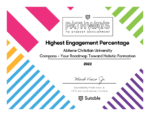
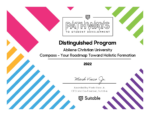 last summer in Philadelphia where ACU Compass won two awards: Highest Student Engagement (91% engagement rate) and The Distinguished Program Award. Suitable provides the technology platform supporting the Compass initiative. Reese said Compass was designed to help students engage in various activities and experiences that help them grow in various ways: intellectually, spiritually, professionally, etc.
last summer in Philadelphia where ACU Compass won two awards: Highest Student Engagement (91% engagement rate) and The Distinguished Program Award. Suitable provides the technology platform supporting the Compass initiative. Reese said Compass was designed to help students engage in various activities and experiences that help them grow in various ways: intellectually, spiritually, professionally, etc.
“We must think about creating an integrated student experience,” Reese said. “Designing curricular and co-curricular activities should be intentional, and we need to communicate to students that these activities all contribute to their holistic development. That is why we designed Compass.”
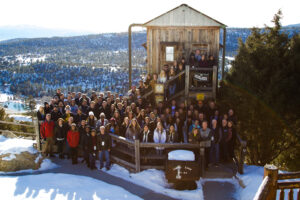
Leadership Summit 2020 attendees (a program of the Lytle Center for Faith and Leadership).
Compass, however, is about more than the teaching that goes on in the classroom. It is about merging different experiences into the classroom, engaging students in projects and internships, and providing opportunities for them to lead in student organizations, etc. It’s about bringing in speakers and employers, going on Study Abroad trips, and participating in the Griggs Center or Lytle Center. It’s not just what is done inside the classroom.
“We have a BBA badge for our pre-business students and are working on reformatting the professional development badge and including a Lytle Center badge,” said M.C. Jennings, Student Engagement and Marketing Manager for COBA. “We want students to be able to keep track of all of their accomplishments and have a portfolio that they will be able to share with future employers that show all of the things they were involved in (Study Abroad, speakers, special projects), holds their resume and cover letter, has academic accomplishments, etc. Eventually, we hope to have more class assignments tied to Compass through Canvas. This is a tool that will enable students to track their academic, professional, personal, and spiritual growth throughout their time at ACU.”
And all of this is part of the holistic learning environment being fostered in COBA, an environment that is necessary for students preparing to enter the world away from ACU.
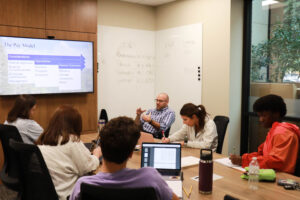
Dr. Matt Deeg takes students out of the regular classroom to learn about HR in a more interactive setting.
“Excellence is demanded of our graduates upon graduation,” said Tim Johnston, Assistant Dean of COBA. “Professors have the tough task of teaching to a high standard and evaluating a student’s ability to complete the assignments to standard. At ACU, our class size and Christian mission make the learning experience very personal. Striking the balance between objective assessment and personal care for an individual student is complex. Our professional development program and alumni connections help support the need for a student to achieve learning excellence.”
But, Reese said, that learning excellence must now include many different facets than might have been required even as few as five years ago.
“Today education is more holistic, and the responsibility of a university – particularly a Christian university – is to help form the whole student. That means that curriculum and pedagogy matter, and additional equipping of students with professional and life skills is vital. Expanding their awareness of diverse cultures and peoples, while developing the type of character that will enhance their careers and bless the world are challenges we address with focused intentionality.”